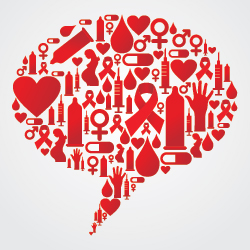Living with HIV: Education
 HIV affects thousands of teens and young adults. Between 2006 and 2009, 29,740 teens and young adults between the ages of 13-24 were diagnosed with HIV. In 2009, the young adults between the ages of 20-24 accounted for the highest rate of new HIV diagnoses. Even though HIV has been around in the United States for approximately 30 years and HIV/AIDS education is included in school based health curricula, there are still misconceptions and stigma associated with the disease.
HIV affects thousands of teens and young adults. Between 2006 and 2009, 29,740 teens and young adults between the ages of 13-24 were diagnosed with HIV. In 2009, the young adults between the ages of 20-24 accounted for the highest rate of new HIV diagnoses. Even though HIV has been around in the United States for approximately 30 years and HIV/AIDS education is included in school based health curricula, there are still misconceptions and stigma associated with the disease.
In the sixth entry in our “Living with HIV” blog series, teens and young adults address their thoughts and feelings concerning HIV and AIDS-related education. All of the material was written by teens and young adults living with HIV.
-The Young Men’s Health Initiative staff
- “I don’t educate people on HIV because people assume things. When I do say something about HIV and people ask why I know so much I turn it back on them. I say things like “This is a routine medical test, why don’t you know about HIV? You should be tested at least every year.” I want people to get tested and to talk to their doctors about it. They don’t.”
- “As much as I want to inform people, I stop myself from going too far because then they start asking questions about why I know so much. I want to say “come on people, go to the Discovery Channel or read a book!” Information can be everywhere but people don’t use it, and they don’t know if it’s good information or not.”
- “People talk trash about HIV at work. I was on a panel to talk about HIV once; I stressed how we need new education, good education, and complete education. It’s not working what they’re doing now. People don’t know HIV isn’t AIDS. People don’t know what HIV is; they don’t know how you get it or what happens to your body. People just don’t know. It’s very frustrating… We need better education.”
- “If someone throws a question at me I will respond – but in general, I’ll stay out of it because I don’t want to get heated, I don’t want to get mad at the ignorance.”
- “People are dumb, they’re uneducated. I knew this kid who got the same STD three times. Like, come on dude! Didn’t you not learn the first time how you got it and how to not get it again? It just really aggravates me because they don’t know and act dumb… think they can’t get something. Sometimes during those conversations I act dumb and don’t say anything because I don’t want to get annoyed.”
- “For example, getting on the bus is an everyday situation – people should know how to get on and off the bus – so I get annoyed at that. Move back so people can fit already! But HIV – people don’t know what it is and it isn’t an everyday situation. So if someone is promiscuous, they should know to get tested. But HIV is different because of the stigma surrounding it so people are afraid. We need to break down the stigma, and part of that can be helped with better education.”
- “I have so much anger around education on HIV and AIDS. There is WAY too much mis-education. Like the basics aren’t good enough. If you’re going to teach about HIV, teach about it. Tell me what it will do to my body; tell me how I will AND WONT get it. Education can make the biggest difference, but people are too afraid to get educated and let students be educated because of stigma, they’re afraid.”
- “Sometimes I want to tell my friends because of the small comments I hear that upset me. They do it to instigate me sometimes, I think because they know I’m passionate about it. It gets me mad. I just deny I have HIV every time. I tell them I know a lot about it because I go and educate others about it.”
- “It’s inside your body, not on your skin. You can’t get it from touching me you know.”
-Anonymous

